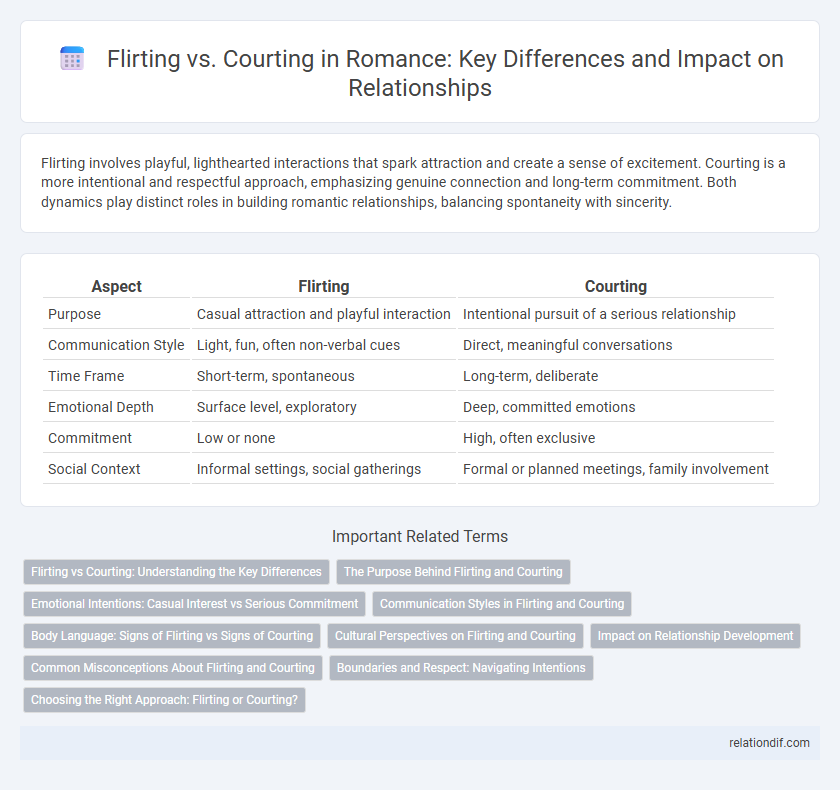Flirting involves playful, lighthearted interactions that spark attraction and create a sense of excitement. Courting is a more intentional and respectful approach, emphasizing genuine connection and long-term commitment. Both dynamics play distinct roles in building romantic relationships, balancing spontaneity with sincerity.
Table of Comparison
| Aspect | Flirting | Courting |
|---|---|---|
| Purpose | Casual attraction and playful interaction | Intentional pursuit of a serious relationship |
| Communication Style | Light, fun, often non-verbal cues | Direct, meaningful conversations |
| Time Frame | Short-term, spontaneous | Long-term, deliberate |
| Emotional Depth | Surface level, exploratory | Deep, committed emotions |
| Commitment | Low or none | High, often exclusive |
| Social Context | Informal settings, social gatherings | Formal or planned meetings, family involvement |
Flirting vs Courting: Understanding the Key Differences
Flirting involves playful and spontaneous behaviors aimed at expressing romantic or sexual interest, often marked by light teasing, compliments, and subtle body language. Courting is a more deliberate and respectful approach focused on building a serious relationship, characterized by intentional communication, consistent effort, and long-term commitment. Understanding these key differences helps individuals navigate romantic interactions with clarity and purpose.
The Purpose Behind Flirting and Courting
Flirting serves to spark interest and create playful connection through subtle signals and charm, often without immediate intention of a serious commitment. Courting focuses on intentional actions aimed at building a meaningful, long-term relationship grounded in respect, trust, and shared values. Understanding these purposes helps individuals navigate romantic interactions with clarity and honesty.
Emotional Intentions: Casual Interest vs Serious Commitment
Flirting often signals casual interest, characterized by playful interactions and emotional exploration without immediate expectations. Courting reflects serious commitment, involving intentional actions to build a meaningful, long-term emotional connection. Understanding these emotional intentions helps clarify the dynamics and expectations within romantic relationships.
Communication Styles in Flirting and Courting
Flirting often involves playful, subtle gestures and light-hearted conversations designed to create attraction and test mutual interest, relying heavily on body language, teasing, and humor. Courting emphasizes clear, respectful communication with intentions of building trust and understanding, often involving deeper conversations about values and long-term compatibility. While flirting thrives on spontaneity and charm, courting prioritizes sincerity and purposeful dialogue to foster emotional connection.
Body Language: Signs of Flirting vs Signs of Courting
Body language in flirting often includes playful gestures like light touches, sustained eye contact, and frequent smiling, which indicate interest without deep commitment. Courting body language is more deliberate and respectful, characterized by steady eye contact, attentive posture, and measured physical closeness reflecting genuine intent. Recognizing these nonverbal cues can distinguish casual attraction from purposeful romantic pursuit.
Cultural Perspectives on Flirting and Courting
Cultural perspectives on flirting and courting vary widely, with flirting often viewed as playful and informal, allowing individuals to express romantic interest through subtle gestures or conversation, while courting is typically seen as a serious, intentional pursuit aimed at establishing a long-term relationship. In many Western cultures, flirting is embraced as a casual form of social interaction, whereas courting involves explicit commitments and family involvement, reflecting traditional values. Eastern societies may emphasize modesty and indirect communication in flirting, with courting practices heavily influenced by cultural norms and expectations surrounding marriage.
Impact on Relationship Development
Flirting often initiates attraction through playful and spontaneous interactions, sparking curiosity and emotional interest that can accelerate initial connection. Courting involves deliberate, respectful efforts centered on building trust and long-term commitment, fostering deeper emotional bonds and relationship stability. The transition from flirting to courting significantly influences relationship development by shifting focus from short-term excitement to sustained intimacy and mutual understanding.
Common Misconceptions About Flirting and Courting
Flirting is often mistaken for casual, non-serious interaction when it can serve as a deliberate form of expressing romantic interest, while courting is wrongly viewed as outdated rather than a structured process aimed at building long-term relationships. Many assume flirting lacks intention, ignoring that subtle cues and body language play critical roles in signaling attraction. Courting involves clear communication and respect for boundaries, distinguishing it from playful or ambiguous flirting behaviors.
Boundaries and Respect: Navigating Intentions
Flirting involves playful and often spontaneous interactions that test mutual interest while maintaining light boundaries to gauge comfort levels. Courting emphasizes intentional actions with clearly communicated boundaries, showing respect for emotional safety and long-term compatibility. Navigating intentions requires attentiveness to verbal and nonverbal cues, ensuring both parties feel valued and respected throughout the romantic exploration.
Choosing the Right Approach: Flirting or Courting?
Choosing between flirting and courting depends on relationship goals and personal values. Flirting often involves playful, spontaneous interaction aimed at gauging interest, while courting emphasizes intentional, respectful efforts toward building a committed partnership. Understanding emotional readiness and communication style helps determine the most effective approach for meaningful romantic connections.
flirting vs courting Infographic

 relationdif.com
relationdif.com